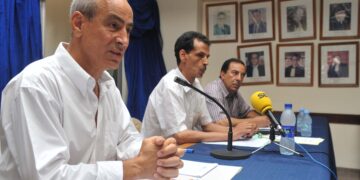Two Billion Dollar Saudi Government Investment in Kushner Investment Scheme "Affinity Partners" Raises Serious Questions about Conflict of Interest, Corrupt Practices
(Washington D.C., April 28, 2022)- The Department of Justice and the U.S. Congress should investigate the disturbing facts and circumstances surrounding the July 2021 $2 billion dollar investment of Saudi Arabia's sovereign Public Investment Fund (PIF) into Affinity Partners, established by former Trump White House adviser Jared Kushner, said Democracy for the Arab World Now (DAWN), in a letter sent today to U.S. Congress and the Department of Justice.
Crown Prince Mohamed bin Salman's (MBS) decision to invest the Saudi government's assets in Affinity Partners, despite the reported objections of the PIF's advisory panel, and following Kushner's close relationship and association with MBS while Kushner was in government, raises serious concerns about unlawful and unethical conduct, including conflicts of interest, solicitation of foreign government officials while in office, and breaches of confidential national security.
"President Biden has claimed that battling corruption is one of his top global national security priorities; he should start by curbing the massive corruption and conflict of interest in our government due to government officials who shamelessly sell their services to foreign governments once their term is up," said Sarah Leah Whitson, Executive Director of DAWN. "Neither Biden nor anyone else can save America's democracy if we allow the festering legalized corruption within our own government to persist."
The U.S. Department of Justice and the U.S. Congress should investigate the solicitations made by Kushner, his agents, and Affinity Partners staff, including establishing a record of any and all communications they had with MBS or any other person regarding the fund, as well as when these communications took place.
The investigation should include a thorough examination of the terms of any such investment, and what promises and services were and will be delivered in exchange for this investment, to determine if U.S. federal laws and ethics rules restricting conflicts of interest, lobbying disclosures, and corruption have been breached. Senator Warren echoed demands for such a congressional investigation on April 17, stating:
- I think there's a question that the Department of Justice should take a really hard look to see if that fits within any of our current – I mean it is a kind of shaggy dog version of how you get to what is going on here – does it violate any of our criminal laws? And I'd want to take a hard look at that…. I think this is a moment where Congress needs to do a lot more about corruption.
The U.S. Congress should also initiate efforts to pass legislation that would clearly and unequivocally prohibit all former government officials from working from, advising, or soliciting foreign government officials or entities for at least five years from the end of their employment. "We need Congress to act now to pass new conflict of interest laws that will prohibit former government officials with access to sensitive national security information from turning around and selling their services, knowledge and access to foreign governments," said Whitson. "The absence of strong conflict of interest laws has created a dangerous and expanding threat to U.S. national security, as former U.S. officials increasingly race to monetize their work for our government into lucrative contracts with foreign governments."
On April 10, The New York Times reported that PIF had invested $2 billion in Affinity Partners, and appeared to be the only main investor in the fund, which has only $500 million in additional claimed investments. According to the June 30, 2021 minutes of the PIF advisory panel meeting obtained by The New York Times, the PIF's advisory panel rejected the Affinity Partners solicitation, citing "the inexperience of the Affinity Fund management"; the possibility that the kingdom would be responsible for "the bulk of the investment and risk"; due diligence on the fledgling firm's operations that found them "unsatisfactory in all aspects"; a proposed asset management fee that "seems excessive"; and "public relations risks" from Mr. Kushner's prior role as a senior adviser to his father-in-law, former President Donald J. Trump.
Despite these now publicly revealed objections, MBS is reported to have overruled the advisory panel and ordered the PIF, which he heads as chairman, to proceed with the investment. A recent Washington Post editorial raised serious questions about the investment's appearance as a reward for Kushner's political support and protection of MBS despite the crimes he committed in connection with the Yemen war and Khashoggi's murder, and a political bet on "the Trump family's political future — specifically, a possible White House comeback by Mr. Kushner's father-in-law if he runs again, and wins, in the 2024 presidential election."
It appears that Kushner established Affinity Partners around July 2021. According to Reuters, the firm has hired 20 people but Kushner and the vast majority of the listed staff have no venture capital or equity capital investment experience. The "deck of cards" used to solicit investment in the fund that DAWN obtained from a prospective investor revealed no specifics of its investment strategy or plans, cited no investment track record, and showed an organizational chart that was completely devoid of names.
In addition, Stephen Mnuchin, former Treasury Secretary in the Trump administration, established his own investment vehicle, Liberty Investment Fund, in which the Saudi government fund has invested $1 billion dollars creating similar concerns about conflict of interest.
Jared Kushner was the first Trump official reported to establish close ties with MBS, predating the election of President Trump. The Department of Justice has indicted Thomas Barrack in an investigation into illicit foreign government campaign contributions and election interference on behalf of the United Arab Emirates for the Trump campaign.
Kushner and MBS established a close working relationship that included reports that Kushner organized MBS's visit and dinner at the Trump White House in March 2017, followed by Trump's visit to Riyadh. Kushner is reported to have shared confidential national security information about the identities of Saudi nationals who had held meetings with the State Department and Trump administration with MBS, prior to the murder of U.S. resident Jamal Khashoggi and the attempted murder of Saad Aljabri, a former Saudi official who had fled the country in the wake of MBS's deposing of former Crown Prince Mohamed bin Nayef (MBN). Kushner is also reported to have shared confidential U.S. intelligence information with MBS about a plan of MBN's to in turn depose MBS as Crown Prince, immediately after which MBS detained MBN without charge in March 2020. MBN remains detained and has no public communications since then.
Following the murder of Jamal Khashoggi by MBS and his agents on October 3, 2018, Kushner reportedly advised MBS on how to handle the political and public relations fallout from the murder and continued to breach White House rules requiring that National Security Council staff participate in any meetings with foreign government officials in continued private calls with MBS. Speaking to veteran journalist Bob Woodward, President Trump bragged that he "saved his ass" referring to MBS after the murder of Khashoggi. Kushner also reportedly helped orchestrate a $110 billion arms sale to Saudi Arabia, and remained a strong supporter of MBS and continued arms sales to the Kingdom despite two bipartisan Congressional votes to end arms sales for the Kingdom's war in Yemen.
U.S. laws restricting the solicitation of, or employment for, foreign government officials and entities after a federal government employee has left office are woefully inadequate, and there appear to be no laws restricting former officials outside of intelligence agencies from working or doing business for foreign governments.
On March 15, 2022, President Biden signed the 2022 Intelligence Authorization Act with provisions prohibiting U.S. intelligence agents with knowledge of national security interests and spycraft from the Central Intelligence Agency, the National Security Agency, and the more than dozen other American intelligence agencies from selling their services to foreign governments for at least 30 months following the end of their federal employment, as well as requiring them to report any foreign government work to the U.S. intelligence community and Congress for five years after they leave service.
Members of Congress proposed the legislation in light of a crisis in intelligence and "spycraft" leaks tied to U.S. intelligence agents working for foreign governments, specifically National Security Agency officials who worked for the U.A.E. government and shared surveillance technology and techniques with them, including hacking hundreds of phones and spying on journalists, dissidents and U.S. citizens in a venture called "Project Raven". The Department of Justice also successfully prosecuted the former intelligence officials for their roles in this spying.
There are, however, strict laws pursuant to 5 C.F.R. 2635 Standards of Ethical Conduct for the Employees of the Federal Branch regarding communications and negotiations of U.S. government officials for future employment or business that require disclosure and recusal of the official while working for the U.S. government. Unfortunately, the only prohibitions on future employment pertain to narrow and limited bans on appearances and communications before the U.S. government, on behalf of the new employer.
"The Justice Department and Congress have a responsibility to investigate exactly when and under what terms Kushner has obtained $2 billion from Saudi government coffers controlled by his close friend, Crown Prince Mohamed bin Salman, which may well violate even our existing, weak ethics laws," said Whitson. "The real task for Congress, however, is to end the terrible incentives that the absence of robust conflict of interest laws have created, allowing rich tyrants to buy American officials."







































